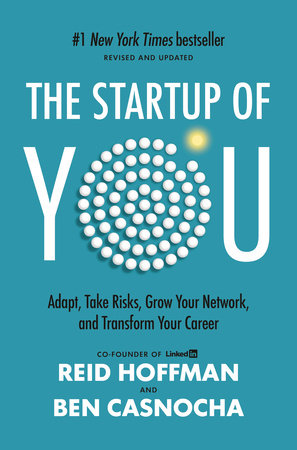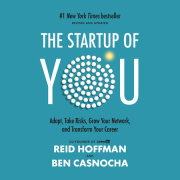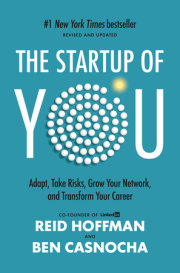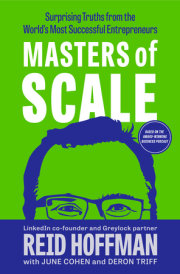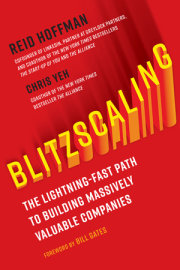Introduction
All Humans Are Entrepreneurs All human beings are entrepreneurs. When we were in the caves, we were all self-employed . . . finding our food, feeding ourselves. That’s where human history began. As civilization came, we suppressed it. We became “labor” because they stamped us, “You are labor.” We forgot that we are entrepreneurs.
—Muhammad Yunus, Nobel Peace Prize winner and microfinance pioneerYou were born an entrepreneur.
This doesn’t mean you were born to start companies. In fact, most people shouldn’t start companies. The odds of success are small, the emotional roller coaster constant.
All humans are entrepreneurs not because they should start companies but because the will to create and take control of our destiny is encoded in human DNA—and creation is the essence of entrepreneurship. As Yunus says, our ancestors in the caves had to feed themselves; they had to invent rules of living. They were founders of their own lives first, and founders of civilizations only later. In the millennia since then we forgot that we are by our very nature entrepreneurs. Instead, we’ve been acting like “labor,” as Yunus puts it. This isn’t the way to create a great career.
To adapt to the challenges of professional life today and take control of our careers, we need to rediscover our entrepreneurial instincts and use them to forge new paths. Whether you’re a lawyer or a doctor, a teacher or an engineer, an Uber driver or even a business owner, in the twenty-first century you need to also think of yourself as an entrepreneur at the helm of at least one living, breathing, growing startup venture:
your career. In the pages ahead, we’re going to help you do just that.
When we published the first edition of this book in 2012, we were confident that the core idea of approaching your career as an entrepreneurial venture would have staying power. But we didn’t fully anticipate that over the course of the subsequent decade this central tenet would become even more relevant and important for everyone. As we write this in 2022, we have entered a brave new professional world. Massive large-scale changes have occurred, from where we work, to how we communicate, to shifts in culture, to political upheavals, to global pandemics. This updated edition addresses these recent developments.
This book is not a job-hunting manual. You won’t find tips and tricks on how to format your résumé or how to prepare for a job interview. What you will find are the startup mindsets and strategies that will help you expand the reach of your network, gain a competitive edge, and land better opportunities.
How Did We Get Here?
In the United States and other developed economies, the latter half of the twentieth century offered career trajectories for educated workers that worked like an escalator. After graduating from college, you landed an entry-level job at the bottom of the escalator at an IBM or a GE or a Goldman Sachs. There you were groomed and mentored, receiving training and professional development from your employer. As you gained experience, you were whisked up the organizational hierarchy, clearing room for the ambitious young graduates who followed to fill the same entry-level positions you and your peers had moved up from. So long as you played nice and performed relatively well, you rose steadily up the escalator, and each step brought with it more power, income, and job security. Eventually, around age sixty-five, you stepped off the escalator, allowing mid-level employees to fill the same senior positions you just vacated. You, meanwhile, coasted into a comfortable retirement financed by a company pension and government-funded retirement program. People didn’t assume that all of these steps necessarily happened automatically. But there was a sense that if you were basically competent, put forth a good effort, and weren’t unlucky, the strong winds at your back would eventually lift you to a respectably high level. For the most part this was a justified expectation. You didn’t have to be entrepreneurial. You just had to go to work and meet expectations.
When we published the first edition of this book, that “career escalator,” as the writer Ronald Brownstein dubbed it, was jammed at every level. It had been for a while. Many young people, even the most highly educated, were stuck at the bottom, underemployed, or jobless, or trapped in dead-end positions out of sync with their ambitions and talents. Meanwhile, men and women in their sixties and seventies, with empty pensions and a government safety net that looked like Swiss cheese, were staying in or rejoining the workforce in record numbers. At best, this formula keeps middle-aged workers stuck in promotionless limbo; at worst, it squeezes them out in order to make room for more-senior talent. Today, this is all still true, only more so. It’s harder than ever for the young to get on the escalator, for the middle-aged to ascend, and for anyone over sixty to get off. Honestly, career paths barely even look like an escalator anymore—more like a jungle with trees we are all scrambling to climb without falling. Even the time-tested pipeline to entering the workforce—a four-year college degree—is in crisis as higher education enrollment steadily declines.
Globalization and the tech revolution have undone traditional career assumptions. Technology automates jobs that used to require hard-earned knowledge and skills, including well-paid white-collar jobs such as paralegals and radiologists, to name just two examples. This erasure of certain positions will only continue with the AI revolution that is already sweeping across industries. Of course, technology also creates new jobs, but job creation tends to lag behind job displacement, and the new jobs usually require different, higher-level skills than the ones they replaced. If technology doesn’t eliminate or change the skills you need in many industries, it at least enables more people from around the world (often cheaper freelancers) to compete for your job by allowing companies to offshore work more easily—knocking down your salary in the process. Trade and technology did not appear overnight and are not going away anytime soon. The labor market in which we all work has been permanently altered.
One major change has been the disintegration of the longterm pact between employee and employer that used to guarantee lifetime employment and training in exchange for lifelong loyalty. With the death of traditional career paths, you can bid farewell to the kind of traditional professional development previous generations enjoyed. You can no longer count on employer-sponsored training. The expectation for even junior employees is that you can do the job you’ve been hired to do upon arrival or that you’ll learn so quickly you’ll be up to speed within weeks. Whether you want to learn a new skill or simply be better at the job you were hired to do, it’s now your job to train and invest in yourself. Companies aren’t inclined to invest in you, in part because you’re not likely to commit years and years of your life to working there. This relentless decaying of the employer-employee relationship is especially true as companies become more geographically distributed and more employees work remotely—those employees can often feel less personally connected to their colleagues and company culture. As we describe in our book
The Alliance, the old indefinite employment pact has been replaced by performance-based “tours of duty” that are periodically up for renewal by both sides.
Professional loyalty in your career now flows “horizontally” to and from your network rather than “vertically” to your superiors, as Dan Pink has noted. The United States (and its peers) have largely become, as he famously put it, a free agent nation.
We are now living in a free agent world.
Forget the old world of careers. That era is over. The rules have changed.
Copyright © 2012 by Reid Hoffman. All rights reserved. No part of this excerpt may be reproduced or reprinted without permission in writing from the publisher.

